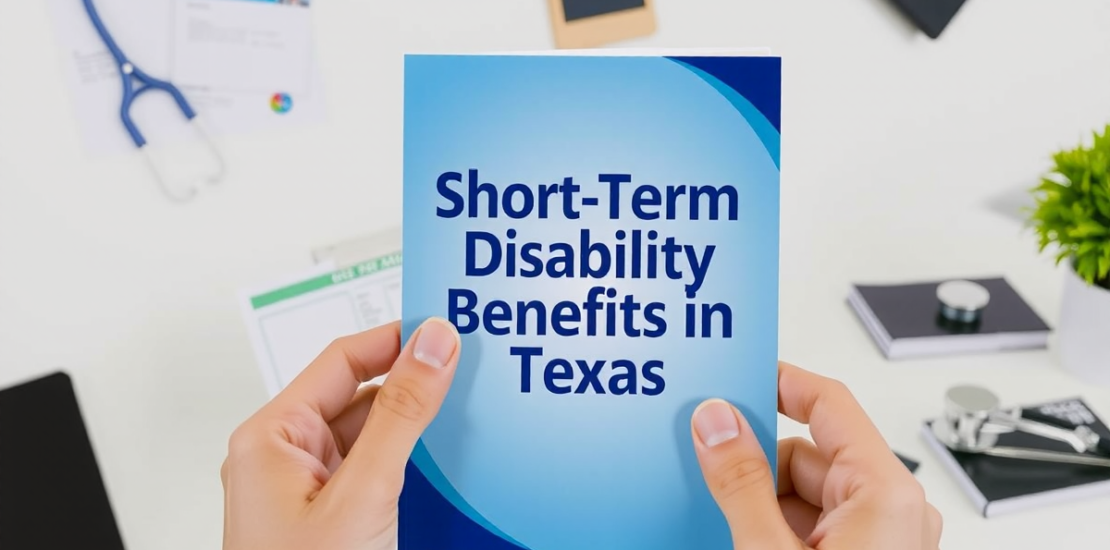Short-Term Disability in Texas: 7 Key Benefits You Shouldn’t Ignore
- October 24, 2024
- Posted by: admin
- Categories: Employee Benefits, Short-Term Disability

Short-term disability (STD) insurance, commonly known as short time disability coverage, provides a crucial financial safety net for employees facing temporary health challenges. In Texas, employers and employees alike recognize the importance of having short term disability Texas insurance to safeguard income during unforeseen medical events.
Unlike other states, Texas doesn’t mandate employers to offer short-term disability insurance. Yet, more businesses are choosing to provide this coverage, as it protects employees when they need financial help the most. In fact, short-term disability insurance is more than just a perk—it’s a necessity. In this article, we’ll dive into how it works, what it covers, and why it’s so beneficial to have in place.
Table of Contents
What is Short-Term Disability (STD) Insurance in Texas?
Short-term disability insurance provides wage replacement for employees who are temporarily unable to work due to non-work-related illnesses, injuries, or medical conditions. Typically, it covers between 50% to 70% of an employee’s salary for a limited period, allowing them to recover without the stress of financial instability.
In Texas, short-term disability insurance is often included as part of a worksite benefits package. These packages allow employees access to a range of valuable insurance options, with short-term disability being one of the most critical components. Offering this type of insurance within a worksite benefits package makes it easier for businesses to provide comprehensive coverage while ensuring employees are protected against income loss due to temporary medical conditions.
For Texas residents, short-term disability insurance can mean the difference between staying financially afloat and falling into debt when faced with an illness or injury. It offers peace of mind by ensuring that if you’re unable to work due to a temporary disability, you won’t lose your income entirely. Not only does it benefit individuals, but employers also find it helps retain top talent by showing their commitment to employee welfare.
While Texas law doesn’t require employers to provide short-term disability, many businesses see it as a competitive advantage. It’s a way to attract and retain skilled workers, particularly in industries where physical labor or health risks are common. When employees know they are covered, they are more likely to feel secure in their job, leading to increased productivity and job satisfaction.
How Does Short-Term Disability Texas Work?
Short-term disability in Texas operates similarly to other states but with a few specific considerations. First, the insurance covers non-work-related injuries or illnesses. Work-related incidents are typically covered by workers’ compensation.
To be eligible for short-term disability benefits, you usually need to meet the following criteria:
- Employment Status: Full-time employees or those meeting specific work-hour requirements may qualify.
- Waiting Period: Benefits often kick in after a waiting period, typically between 7 to 14 days. During this time, employees must use sick leave or paid time off (PTO) if available.
- Benefit Duration: Coverage typically lasts between 3 to 6 months, depending on the policy. However, some plans may offer up to a year of benefits.
- Income Replacement: Most policies replace a portion of an employee’s salary, usually between 50% to 70%, though this varies depending on the insurer.
Understanding how this process works is crucial for both employees and employers. For employees, it’s essential to review the waiting period and benefit duration. For employers, determining the right plan can be a way to enhance overall benefits packages while keeping costs manageable.
What Does Short-Term Disability in Texas Cover?
Coverage provided by short-term disability insurance includes a range of non-work-related injuries and illnesses that may prevent an individual from performing their job. Some of the most common conditions covered include:
- Pregnancy and childbirth recovery
- Major surgeries and post-surgical recovery
- Severe illnesses such as cancer or heart disease
- Mental health conditions, including depression and anxiety
- Accidental injuries, such as broken bones
These conditions highlight how varied the scope of short-term disability can be. From unexpected accidents to planned surgeries, the ability to recover without the stress of losing income is invaluable. Many employees in Texas opt for this type of coverage to ensure that both their health and financial security are safeguarded during recovery periods.
Why Should Employers in Texas Offer Short-Term Disability?
For Texas businesses, offering short-term disability insurance is not just about ticking a box on a benefits package. It’s about investing in the well-being of your employees. Offering short-term disability provides several benefits to employers, such as:
- Employee Retention: When employees know they have financial protection in case of illness or injury, they are more likely to stay loyal to their company.
- Reduced Turnover Costs: Replacing employees can be costly, especially when training new hires. Offering comprehensive benefits can help prevent this.
- Enhanced Morale and Productivity: Employees with peace of mind are more likely to be engaged and productive.
- Competitive Edge in Hiring: In today’s job market, businesses that offer better benefits often attract better candidates. Short-term disability in Texas coverage is one of those key benefits.
Short-term disability is often bundled with other benefits like health, dental, and vision insurance. For employers in Texas, offering this type of coverage is not only a way to protect their workforce, but it also creates a more attractive package for potential hires. It sets a business apart in a competitive market where employees are looking for comprehensive benefits.
The Role of Worksite Benefits in Texas Businesses
Worksite benefits, which often include short-term disability, are structured to meet the needs of both employers and employees. These packages generally offer voluntary benefits—insurance options that employees can opt into. Short-term disability is one of the most popular offerings, as it directly supports employees during times of medical need. While worksite benefits may also include life insurance, accident insurance, and critical illness coverage, short-term disability tends to be viewed as the cornerstone because of its immediate impact on financial stability.
For many Texas employers, providing worksite benefits like short-term disability in Texas can reduce workplace stress, increase employee loyalty, and even improve overall productivity. When employees know they are protected financially, they are more likely to focus on their work and feel valued by their employer.
How to Get Short-Term Disability in Texas
There are several ways to obtain short-term disability in Texas, whether you are an employer or an individual. Here’s a brief overview:
- Employers: Many Texas employers offer short-term disability insurance as part of a group benefits package, often under worksite benefits. Group rates tend to be more affordable, and businesses often work with brokers to find the best plans for their employees.
- Individuals: If your employer doesn’t offer short-term disability insurance, or you are self-employed, you can purchase a policy directly from an insurance provider. Many private insurers offer individual plans with varying levels of coverage, so it’s essential to shop around and compare terms.
In both cases, it’s important to read the fine print and understand the terms of coverage, including waiting periods, benefit limits, and pre-existing condition exclusions.
What Happens When Short-Term Disability In Texas Ends?
For most employees in Texas, short-term disability covers them for a few months to a year. But what happens when the short-term coverage ends? If an employee is still unable to return to work, they may need to look into long-term disability insurance or other financial assistance programs.
Many employers offer long-term disability insurance as a next step, providing extended income replacement beyond the term of the short-term policy. It’s essential for employees to plan ahead and understand the potential transition from short-term also referred to as short time disability to long-term coverage if their medical condition persists.
The Importance of Educating Employees About Short-Term Disability(STD) in Texas
One of the challenges employers face is ensuring that employees fully understand the benefits available to them, including short-term disability. Many employees are unaware of the process for filing a claim, the waiting periods involved, or the duration of benefits.
Employers in Texas should make it a priority to educate their workforce about the available benefits, how to file claims, and what to expect during the process. Offering workshops, seminars, or simple informational brochures can make a significant difference in helping employees feel more secure and prepared.
Conclusion
Short-term disability (STD) insurance is an important, though often overlooked, component of a comprehensive benefits plan in Texas. Whether you’re an individual seeking protection or a business looking to attract and retain top talent, having short-term disability in Texas coverage can make a huge difference. In a state like Texas, where there’s no mandate for this type of coverage, being proactive in securing short-term disability insurance is a smart and responsible choice.
Both employees and employers stand to benefit significantly from understanding the nuances of short-term disability insurance. The peace of mind it brings is invaluable, ensuring that financial worries don’t compound the stress of recovery from illness or injury.
Want to learn more about this and other employee benefits solutions? Visit our YouTube channel for informative videos or check out our articles section for in-depth insights. Stay informed with Medcore Brokerage, the Best Employee Benefits Consultant in Texas
FAQs
What qualifies as short-term disability in Texas?
Any non-work-related illness, injury, or medical condition that prevents an individual from working for a temporary period qualifies as a short-term disability. This includes conditions like pregnancy, surgery recovery, or severe illness.
How long do short-term disability in Texas benefits last?
Typically, short-term disability benefits last between 3 to 6 months. Some policies may extend coverage up to 1 year, depending on the terms of the plan.
Do employers have to provide short-term disability in Texas?
No, Texas law does not mandate employers to provide short-term disability insurance. However, many employers choose to offer it as part of their worksite benefits package to enhance employee retention and satisfaction.
Can self-employed individuals get short-term disability in Texas?
Yes, self-employed individuals can purchase short-term disability insurance through private insurers. It’s important to compare policies to find the one that offers the right balance of coverage and affordability.
Does short-term disability in Texas cover pregnancy?
Yes, short-term disability typically covers pregnancy and the recovery period after childbirth, including complications that may arise during pregnancy.
How is short-term disability taxed in Texas?
If the employer pays the premiums, the benefits received may be taxable. However, if the employee pays the premiums with post-tax dollars, the benefits are generally not taxable.
Is STD Insurance the Same as Short Term Disability Insurance?
Yes, STD insurance is simply another name for short-term disability (STD) insurance. It’s a common abbreviation used by both insurance providers and employers to describe coverage that provides financial assistance to employees who are temporarily unable to work due to illness or injury. In Texas, STD insurance offers income replacement for a set period, typically up to six months, and is designed to help cover basic expenses during recovery. When you see “STD insurance” and “short-term disability insurance,” they’re referring to the same type of coverage.
How Does Short Time Disability Differ from Long-Term Disability in Texas?
Short time disability, or short-term disability insurance, is meant to provide income replacement for temporary disabilities lasting a few weeks to several months—usually up to six months. In contrast, long-term disability insurance in Texas kicks in after short-term benefits are exhausted and covers disabilities lasting for an extended period, often several years or until retirement, depending on the policy. While both offer financial support, short-term disability is intended for shorter recovery periods, whereas long-term disability is there for more prolonged or permanent disabilities. Together, they form a comprehensive safety net for Texas employees facing different levels of health challenges.

